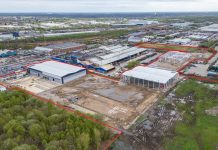New job creation in Manchester is outpacing other regional centres across the UK, providing a major boost to the city’s property markets according to adviser JLL.
Figures released at JLL’s annual North West market update at Bridgewater Hall in Manchester show that the city is expected to have over 10,000 more office workers by 2021 than it did in 2018*. Coupled with the highest wage growth since 2008, this is having a positive impact on the regional office, residential and industrial property markets.
JLL outlined how Manchester has retained the top spot for office space take-up among the six biggest regional cities since it began recording the data more than 15 years ago. In 2018, 1.75 million sq ft of office space was transacted in Manchester, up 54% on the 10-year average. Meanwhile it also had the greatest volume of inward investment deals (23) compared with Glasgow, Edinburgh, Birmingham, Leeds and Bristol. New and expanding business districts like Bruntwood’s Circle Sq and Ask’s First Street will be essential in capturing high demand, according to the property adviser.
Elaine Rossall, UK head of offices research at JLL, said: “When thinking of the UK’s strongest property markets, Manchester continues to be in a league of its own. Job creation is at record levels and is spread across a range of sectors. Commercial development is increasingly catering to occupier demand and this is translating into positive, continued growth across the other property markets.
“The current strength is also against a backdrop of the UK economy performing better than expected in the run up to Brexit, with Manchester really bucking expectations.”
The consultant also explained how the North West was performing across other markets as a result of Manchester’s growth. It revealed how vacancy rates for industrial properties larger than 100,000 sq ft in the North West were 10 per cent at the end of Q1 2019, two points above the national average. However, JLL says this availability presents an opportunity for the region to capitalise on UK-wide demand from active retailer and e-fulfilment occupiers.
It says that while occupiers may be delaying decisions as a result of Brexit, there is still healthy demand for larger industrial stock. Meanwhile the smaller multi-let industrial market has been unaffected by Brexit according to JLL, which has completed nine transactions totalling 750,000 sq ft so far this year.
On the high street, the consultant outlined an increasing need for local authorities to partner with private landlords and review retail assets’ potential for redevelopment into spaces for residential and leisure use. Its planning and development team recently consulted on the redevelopment of a 50,000 sq ft unit in Warrington, left vacant after the collapse of retailer BHS, of which half will now be taken by bowling operator, Superbowl UK. Its figures show that in 2018 North West town centre vacancy rates had grown to 15%, three points above the UK average, leaving voids of 20 million sq ft across the region.
JLL also identified what it sees as a new opportunity for Manchester’s residential developers – schemes for older people looking to downsize. A report released by Manchester School of Architecture presents a survey of 3,364 people over the age of 50; more than half (57%) of over 50s said they would like to move home, while only 3.4% actually did. It also reported that only 47% of those who did move downsized to a house with fewer rooms, and the majority of these movers were over the age of 80. JLL says this has created an opportunity for higher-quality spec homes to suit this increasingly affluent demographic who are being drawn into cities in the same way younger generations have been in recent years.
David Lathwood, lead director in the North West for JLL, said: “Each year we look at the UK’s big six regional centres, it’s clear that Manchester isn’t just already outperforming other cities but that the opportunities in front of it are rich and diverse.
“This year, it’s also clear that Brexit uncertainty hasn’t had the same impact on occupier sentiment than it has in other areas of the country. The fact that we’ve had another record-breaking year of office take-up means the priority for the market now is ensuring that development rates can keep up.”






















